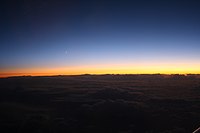
Photo from wikipedia
Abstract Although there have been numerous studies on the evaluation of models that estimate sky diffuse radiation on inclined surfaces, it is still difficult for investigators to select from available… Click to show full abstract
Abstract Although there have been numerous studies on the evaluation of models that estimate sky diffuse radiation on inclined surfaces, it is still difficult for investigators to select from available sky diffuse radiation models for urban microclimate and building performance simulation. This is due to the fact that results from different studies are not consistent, or even contradictive, which indicates the fact that the evaluation criterion itself has a great effect on the performance of the model. To explore the effect of different evaluation criteria on the performance rating of the models, four evaluation methods are applied in this paper: diffuse irradiance on facades with respect to sky condition, diffuse irradiance on facades with respect to orientation, diffuse irradiance distribution among sky dome with respect to sky condition and diffuse irradiance on buildings in obstructed environment. Based on a statistical test on available data, Igawa model is considered to be the most accurate and appropriate model for urban and building energy simulation. Besides, an evaluation criterion appropriate for screening sky diffuse models for urban and building energy simulation is proposed. Furthermore, potential errors that may occur in the measurement and the corresponding quality control is presented.
Journal Title: Sustainable Cities and Society
Year Published: 2019
Link to full text (if available)
Share on Social Media: Sign Up to like & get
recommendations!